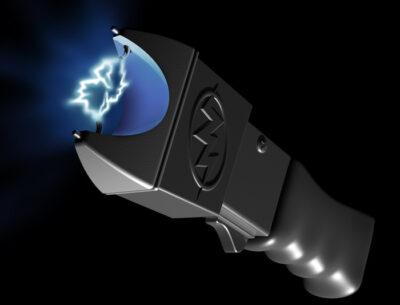The Second Amendment does not guarantee you the right to own or use modern non-lethal weapons – if you live in Massachusetts.
That state’s highest court, the Supreme Judicial Court, upheld a state law banning citizens from owning stun guns and Tasers in a case that could have a national impact.
“Because the stun gun that the defendant possessed is both dangerous per se at common law and unusual, but was not in common use at the time of the enactment of the Second Amendment, we conclude that stun guns fall outside the protection of the Second Amendment,” Justice Francis X. Spina wrote in an a unanimous opinion in a case called Commonwealth vs. Jaime Caetano.
The controversy began when a Massachusetts resident, Jaime Caetano, was arrested in 2011 for carrying a stun gun in her purse. She said she needed it to protect herself from an abusive ex-boyfriend. The stun gun has two metal prongs and a switch, and once activated, can deliver up to 50,000 volts. It has to make contact with a person to work. Caetano filed suit seeking to overturn the law.
Gun rights groups criticized the decision and noted an inconsistency in the law that defies common sense: Lethal weapons are legal, but non-lethal ones are banned.
My Personal Defender: Low Cost Way To Defend Yourself Against Lowlife Criminal Scum!
“The Second Amendment is about arms,” James L. Wallace, executive director of the Gun Owners’ Action League of Massachusetts, told the Worcester Telegram. “It’s not just about guns. It’s basically, whatever reasonable force you can use to defend yourself and somebody else. The Second Amendment could cover pocket knives. It’s an arm. It’s not necessarily a firearm.”
In his opinion, Justice Spina advanced a series of legal arguments that could effectively gut the Second Amendment’s guarantees if they were widely adopted.
Story continues below the video
Spina argued:
- The Second Amendment only guarantees the right to own weapons that were in existence at the time it was adopted in 1791. If taken to its logical conclusion, the only weapons you would be allowed to own are swords, knives and muskets. “We therefore conclude that stun guns were not in common use at the time of the Second Amendment’s enactment,” Spina wrote.
- It would be legal for Caetano to carry deadly weapon but not a less-lethal stun gun. Spina argued that a US Supreme Court pro-gun decision, District of Columbia v. Heller, only applied to firearms. “Without further guidance from the Supreme Court on the scope of the Second Amendment, we do not extend the Second Amendment right articulated by Heller to cover stun guns,” Spina wrote.
- The Second Amendment does not cover stun buns because they are “dangerous and unusual weapons” that have no military application. “A stun gun also is an unusual weapon,” Spina wrote. “Historically, when considering challenges to the ban of dangerous and unusual weapons under the Second Amendment or equivalent State statutes, courts have asked whether the weapon in question is unusual by ascertaining if it is a weapon of warfare to be used by the militia.” But stun guns and Tasers are far from unusual. More than 600,000 Tasers are used by 16,300 law enforcement agencies in 107 countries, according to a 2009 Fortune article. The world’s leading manufacturer of stun guns, Taser International, is a publicly traded company that on Dec. 31 reported revenues of $164 million.
- Any weapon designed or created only for self-defense or attacking people is not protected by the Second Amendment. “The record demonstrates no evidence or argument that its purpose is for anything other than ‘bodily assault or defense,’” Spina wrote.
Wallace said his organization will work to change the law through the legislature.
“This particular court has a long history of being a little bit, shall we say, immature and antiquated when it comes to Second Amendment decisions. And they kind of followed that with this ruling as well,” Wallace said.
Do you believe Tasers and stun guns should be legal? Share your thoughts in the section below:
 Off The Grid News Better Ideas For Off The Grid Living
Off The Grid News Better Ideas For Off The Grid Living





